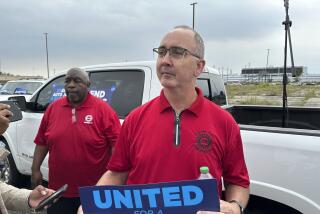Coal Industry Nears Boiling Point Over Insurance Coverage : Labor: Unions warn that bitter strikes are ahead unless problems are resolved that threaten health benefits for 120,000 retired miners and their dependents.
- Share via
HUNTINGTON, W.Va. — Concern over health care has reached the crisis stage in the nation’s coal fields, where a threat to retired miners’ insurance benefits threatens the industry as well.
Both labor and management are afraid of widespread, bitter strikes this spring unless they resolve the financial problems that threaten health insurance coverage for 120,000 retired miners and their dependents in all 50 states.
Previous strikes by the United Mine Workers union “will be kindergarten stuff compared to what you’re going to see,” UMW President Richard Trumka predicted.
Health care has been a fighting issue for miners at least since 1946, when Homer Eckley’s father and tens of thousands of other union members went on strike over the issue.
“That was back when there were no benefits, no nothing,” recalled Eckley, 64, of Cadiz, Ohio, who later entered mining “with the idea that when my time came, I could retire and have benefits plus a pension.”
Now retired after 33 years with Y&O; Coal Co., Eckley received benefits for his prostate cancer treatment until the Mine Workers contract expired in 1988 and Y&O; announced it was no longer obligated to pay his insurance.
“After 33 years, they threw me out,” he said.
Eckley subsequently got health insurance from jointly managed trust funds known as the “orphans’ fund” because it provides benefits to retirees whose last employer has gone out of business or, like Y&O;, refuses to pay.
It’s that fund that’s in serious trouble, the result of rising costs, increasing numbers of “orphans” like Eckley, and fewer companies willing to foot the bill.
The issue is by far the dominant concern in negotiations to replace the UMW’s five-year contract with the Bituminous Coal Operators Assn., which represents 14 of the nation’s largest coal companies. The agreement also sets the pattern for most other UMW contracts.
The contract expires Feb. 1, 1993, and ordinarily new talks would begin this fall. But as early as March or April, the trust funds will have exhausted all the money due under the current agreement.
Trustees of the funds have notified coal operators that they intend to seek a court order that would more than double the operators’ required contributions. Failing that, the trustees said, they were prepared to notify beneficiaries on March 1 that their benefits will end sometime in April.
“If benefits cease, there will be labor turmoil in the coal fields, and if the rates increase, there will be economic turmoil,” said Joseph Brennan, president of the Bituminous Coal Operators Assn. “It will have a catastrophic impact on my membership and on the union.”
It’s a fighting issue because many working coal miners are second-, third- and even fourth-generation UMW members who, when they talk about retiree health care, are talking about their parents and grandparents.
The strain is also great on the community. UMW members are concentrated in rural towns where coal is often the only industry. What affects the retired miner usually affects the whole town.
“Our pensioners are our parents, our grandparents, our aunts and uncles and neighbors,” Trumka said. “If they lose their health care, they will spend their retired years in poverty. And no self-respecting organization would allow its family to sink into sickness, disease and poverty.”
The problem with the funds is too many retirees and not enough money. Of the 120,000 people now receiving benefits, only one-quarter worked for companies that still pay into the funds. Another 60% worked for now-defunct companies, and the rest retired from companies that have stopped contributing.
Court rulings have upheld a company’s right to make that choice once a given contract has expired.
Other courts have found that contract provisions requiring payment of benefits for a worker’s lifetime mean just that: the funds may not refuse benefits to a retired miner just because his or her company doesn’t want to pay the bill.
Still other rulings have added new beneficiaries without any source of funding.
Brennan contends that the industry has a moral obligation to pay for health benefits even if no legal obligation exists.
But coal operators say higher royalties will cause a financial crisis. They had one last year when, as contributions lagged, the funds’ trustees sued for higher payments and a federal court temporarily raised the fee from $2.50 per hour worked by a UMW member to $3.25 per hour.
Some operators followed Y&O; and stopped contributing all together. Those that paid ran into financial problems and had to lay people off.
Brennan contends that the trustees’ latest attempt to increase royalties, from $2.50 per hour to $5.42, will have the same effect.
But there is hope. Working with Sen. Jay Rockefeller, D-W.Va., the union and the participating coal operators agreed on a solution last November, which Rockefeller has introduced in the Senate.
The plan would pay off the funds’ current deficit, estimated at more than $100 million, by transferring surpluses from related pension funds.
Existing coal companies would be responsible for their own retirees. The entire industry would be taxed 75 cents per worker-hour to pay benefits for retirees whose companies no longer exist.
However, the legislation is opposed by non-union coal operators and some formerly union operators who would be required to resume obligation for their retirees.
Some contend that no financing crisis exists. Others argue the problem should be resolved through collective bargaining rather than government intervention.
The cost of the proposal is the real concern for coal companies fighting to remain competitive in a what Trumka calls a “fierce” market, where a cost difference of as little as 10 cents per ton can mean the difference between winning and losing a contract.
“If this legislation doesn’t pass,” Brennan said, “you are going to be looking at 300 or so companies who are faced with agreeing to a contract that maintains the benefits for 120,000 people, or trying to walk away from it as so many others have done. Neither solution is desirable.
“If this doesn’t pass, the glue that has held us all together for so many years is going to collapse. What will replace this bargaining unit, I just don’t know.”
More to Read
Inside the business of entertainment
The Wide Shot brings you news, analysis and insights on everything from streaming wars to production — and what it all means for the future.
You may occasionally receive promotional content from the Los Angeles Times.










